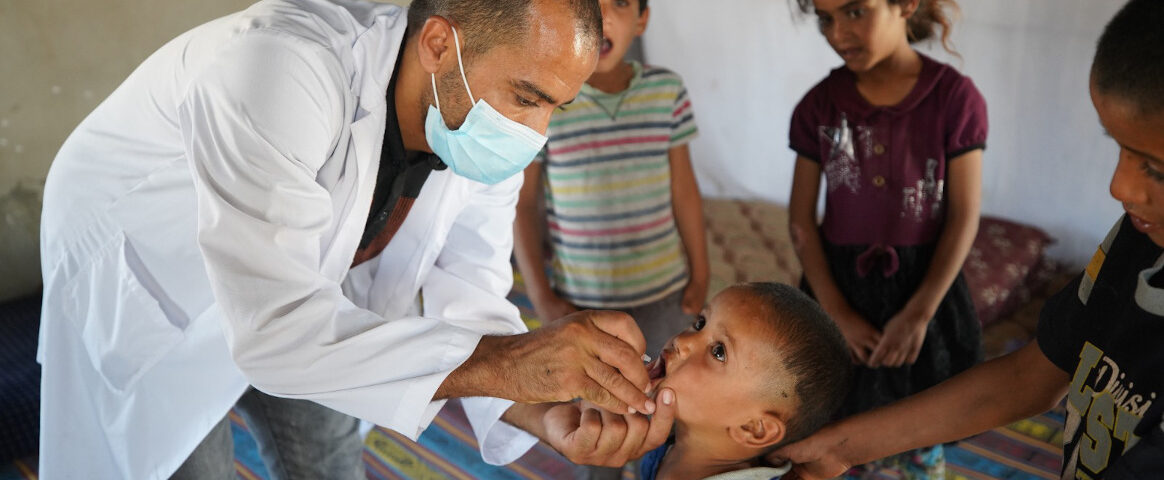
House of Representatives Calls on CBN to Allocate Additional $3 Billion for Agricultural Financing
October 25, 2024
“Israel Conducts Retaliatory Strikes on Iranian Military
October 26, 2024Pakistan has announced six new polio cases, increasing the yearly total to 39

Six additional polio cases were confirmed, bringing the total number of affected children to 39 this year, a Pakistan Health authorities report. The recent cases involve wild poliovirus type 1 (WPV1) and were identified across various provinces: three in Balochistan, two in Sindh, and one in Khyber Pakhtunkhwa. This alarming trend highlights the ongoing struggle against polio, a disease that has the potential to cause irreversible paralysis in young children.
Despite significant progress in global vaccination efforts that have nearly eradicated polio worldwide, Pakistan and Afghanistan remain the last strongholds where the disease is still endemic. The situation in Pakistan is particularly precarious, with health officials emphasizing that there is no cure for polio, and the paralysis it causes is permanent. The resurgence of polio cases serves as a stark reminder of the challenges that lie ahead.
Ayesha Raza Farooq, the Prime Minister’s Focal Person for Polio Eradication, has called for heightened awareness among parents and communities. “This should be a wake-up call for all parents and communities,” she stated. “Every paralytic polio case means there are hundreds of children who are silently affected by poliovirus and are potentially carrying and spreading it throughout their communities
Balochistan has emerged as the hardest-hit province, accounting for 20 of the reported cases this year. Sindh follows with 12 cases, while Khyber Pakhtunkhwa has recorded five. Punjab and Islamabad have each reported one case. The geographic spread of the virus suggests that it is crucial to address the underlying factors that contribute to its persistence.
Melissa Corkum, the chief of the UNICEF polio team in Pakistan, pointed to several factors that exacerbate the ongoing threat of polio. “The continuous movement of populations, security challenges in high-risk areas, and persistent vaccine hesitancy all contribute to the persistence of the virus,” she explained. The dynamics of population movement are particularly concerning, as families frequently relocate, which can facilitate the spread of the virus across regions.
Adding to the complexity of the situation, the World Health Organization (WHO) has confirmed at least 18 polio cases in neighboring Afghanistan this year, with a majority concentrated in the southern part of the country. This regional context highlights the interconnectedness of public health issues, as cross-border movement can lead to the transmission of the virus between Pakistan and Afghanistan.
In response to the growing threat of polio, Pakistan is set to launch a nationwide vaccination campaign on October 28, aiming to immunize over 45 million children under the age of five against paralytic polio. Prior to the recent surge in infections, the country had made significant strides towards eradication, recording only six cases in 2023, a stark decline from 20 cases in 2022 and just one in 2021.
However, health authorities face formidable challenges in encouraging vaccination. Misconceptions about vaccines, fueled by misinformation from hardline clerics and militants, have created an atmosphere of distrust in some communities. These groups have propagated the false narrative that vaccination is a Western conspiracy aimed at sterilizing Muslims. Consequently, many families are hesitant to allow their children to receive vaccines, which leaves them vulnerable to infection.
Moreover, the security situation surrounding vaccination campaigns is dire. In recent years, polio vaccinators and the security personnel assigned to protect them have been targeted by militant groups. This year alone, at least 15 people, primarily police officers, have been killed, and dozens more have sustained injuries during vaccination drives. The violence and threats directed at health workers have resulted in delayed or disrupted campaigns, preventing comprehensive immunization efforts and leaving countless children unprotected.
“Security concerns have, in the past, resulted in delayed or fragmented campaigns, leading to missed opportunities for immunization and leaving children vulnerable,” Ms. Corkum unicef official emphasized. This highlights the urgent need for enhanced security measures and community engagement to ensure that health workers can operate safely.
The increasing number of polio cases in Pakistan is not just a public health concern; it is a humanitarian crisis that demands immediate attention and action from all sectors of society. Parents, community leaders, and government officials must work collaboratively to combat misinformation, ensure the safety of health workers, and promote the importance of vaccination.
The road to eradicating polio in Pakistan is fraught with challenges, but it is essential for the future health and well-being of the nation’s children. The coming months will be critical as the country embarks on its nationwide vaccination campaign. Success hinges on the collective effort of all stakeholders to ensure that every child is reached and vaccinated, ultimately working towards a polio-free future for Pakistan.


